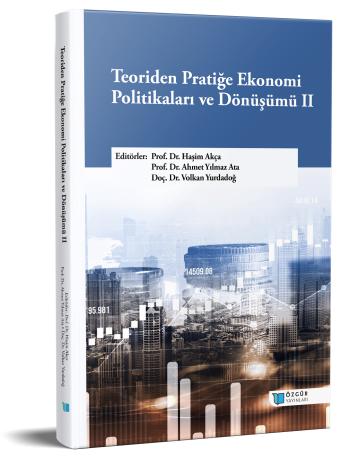
Ekonominin İhmal Edilmiş Çocuğu Tarım Sektörü: Türkiye’de 1923-2023 Dönemi Tarım Politikaları
Şu kitabın bölümü:
Akça,
H.
&
Ata,
A.
Y.
&
Yurdadoğ,
V.
(eds.)
2023.
Teoriden Pratiğe Ekonomi Politikaları ve Dönüşümü II.
Özet
Tarım sektörü, toplumların gıda arz güvenliğinin sağlanmasında ve ülkenin ekonomik kalkınmasının gerçekleştirilmesinde önemli bir role sahiptir. Tarım sektörünün ileriye ve geriye yönelik bağlantı etkisi oldukça yüksektir ve ortaya çıkan değişmeler, diğer sektörleri de etkilemektedir. Tarım sektörünün ileriye bağlantı etkisiyle diğer sektörlere hammadde ve girdi sağlanırken geriye bağlantı etkisiyle diğer sektörlerden ara malı tedarik edilmektedir. Ayrıca tarım sektörünün ekonomiye istihdam yaratmak, tarım ürünleri ihracatı sonucu döviz geliri elde etmek, ulusal gelire katkı sağlamak gibi katma değerleri söz konusudur. Öte yandan, ülkenin ekonomik kalkınmasının gerçekleşmesinin tarım sektöründen başladığı da bilinmektedir.
Bu çalışmanın amacı, Cumhuriyetin kuruluşundan günümüze kadar geçen yüz yıllık süreçte Türkiye’de uygulanan tarım politikalarının incelenmesidir. Cumhuriyetin kurulduğu dönemden günümüze kadar tüm hükümetler, tarımsal üretim açısından kendi kendisine yeterli bir ülke olunmasını hedeflemişlerdir. Atatürk döneminde, sektörün ülke ekonomisindeki ağırlığı oldukça yüksek olmuştur. Bu doğrultuda, 1923 yılında gerçekleştirilen “İzmir İktisat Kongre”sinde alınan kararlarla tarımsal üretim için bir hedef belirlenmiştir. Türkiye’de tarım sektöründe 1938-1950 döneminde devletçi politikalar ve 1950-1960 döneminde ise liberal politikalar izlenmiştir. 1948 yılında alınan “Marshall Yardımı” çerçevesinde traktör ithal edilmiş ve bu sayede tarımsal üretim de hızla artmıştır. 1960-1980 döneminde planlı kalkınma modeli benimsenmiş ve kalkınma planları ile ithal ikameci sanayileşme politikaları izlenmiştir. Böylece, tarım sektöründe belirli ölçüde kendi kendine yeterlilik sağlanmıştır. 1980 sonrası izlenen liberal politikalarla ihracata dayalı sanayileşme politikalarına geçilmiştir. Bu politikalarla birlikte ülke tarımı dış dünyaya açılmış, ithalat artmış, tarımsal kamu iktisadi teşebbüsleri özelleştirilmiştir. Fakat ulusal üreticiler dış rekabetten korunamamış, özellikle bazı tarımsal ürünlerin üretimi azalmaya başlamıştır. Dolayısıyla, Türkiye tarım ürünlerinde dışa bağımlı bir ülke haline gelmiştir. Türkiye’de tarımsal üretimin artırılabilmesi için tarımsal planlamanın uygulanması, tarımsal üretimde verimliliği artıracak desteklerin verilmesi, tarım ürünleri ithalatının sınırlandırılması, mevcut tarımsal kamu işletmelerinin etkinliğinin artırılması gerekmektedir.
Çalışma giriş ve sonuç dışında dört bölümden oluşmaktadır. Öncelikle Türkiye’de 1923-1980 döneminde uygulanan tarım politikaları irdelenmiş, daha sonra 1980-2000 dönemi tarım politikaları ele alınmış, ardından 2000 sonrası dönemdeki tarım politikalarına yer verilmiştir. Son olarak da uygulanan tarımsal destekleme politikalarının sonuçları değerlendirilmiştir.

